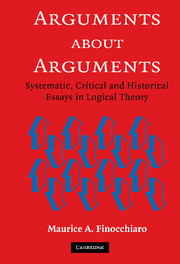Book contents
- Frontmatter
- Contents
- Preface and Acknowledgments
- Introduction : An Approach to a Branch of Logic
- Theorizing about reasoning and argument
- Fallacies and asymmetries
- 6 Fallacies and the Evaluation of Reasoning (1981)
- 7 Six Types of Fallaciousness : Toward a Realistic Theory of Logical Criticism (1987)
- 8 Asymmetries in Argumentation and Evaluation (1992)
- 9 The Positive versus the Negative Evaluation of Arguments (1994)
- Critiques
- Historical analyses
- Selected Bibliography
- Index
8 - Asymmetries in Argumentation and Evaluation (1992)
from Fallacies and asymmetries
Published online by Cambridge University Press: 05 February 2015
- Frontmatter
- Contents
- Preface and Acknowledgments
- Introduction : An Approach to a Branch of Logic
- Theorizing about reasoning and argument
- Fallacies and asymmetries
- 6 Fallacies and the Evaluation of Reasoning (1981)
- 7 Six Types of Fallaciousness : Toward a Realistic Theory of Logical Criticism (1987)
- 8 Asymmetries in Argumentation and Evaluation (1992)
- 9 The Positive versus the Negative Evaluation of Arguments (1994)
- Critiques
- Historical analyses
- Selected Bibliography
- Index
Summary
The Problem
A number of scholars in a variety of fields have elaborated the existence of various cognitive asymmetries relating in one way or another to the practice and theory of argumentation. The purpose of this chapter is to call attention to the problem and to begin examining the nature and implications of these phenomena explicitly from the viewpoint of the theory of argumentation.
Massey: Formal Validation versus Invalidation of Arguments
One of the most gripping of these problems has been discussed by Massey and his critics (Massey 1975a, 1975b, 1981a, 1987; Bencivenga 1979; Finocchiaro 1994a; George 1983; Johnson 1989; McKay 1984, 1987). Their concern has been the question of asymmetry in the evaluation of arguments from the viewpoint of formal logic, namely in assessing the formal validity or formal invalidity of arguments, or in short, in the formal validation and formal invalidation of arguments. Massey has elaborated the thesis that whereas formal logic does provide techniques for proving arguments formally valid, it does not provide any techniques for proving arguments formally invalid; thus there is a fundamental asymmetry between formal validation and formal invalidation, the asymmetry being that the former is feasible but the latter is not. Using argument-theoretical language, and echoing the title of one of Massey's papers, one might say that while it is possible to give good arguments that good arguments are good, it is not possible to give good arguments that bad arguments are bad.
- Type
- Chapter
- Information
- Arguments about ArgumentsSystematic, Critical, and Historical Essays In Logical Theory, pp. 148 - 158Publisher: Cambridge University PressPrint publication year: 2005



